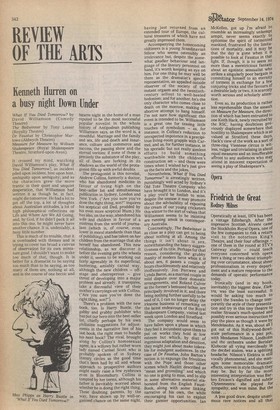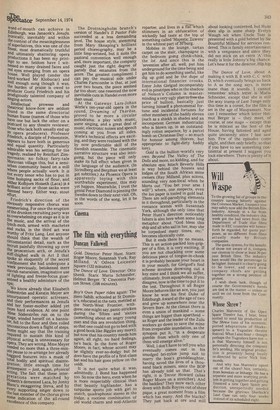Opera
Friedrich the Great
Rodney Eines
Operatically at least, 1974 has been a vintage Edinburgh. After the impressive Scottish Alceste came the Stockholm Royal Opera, one of the few companies to risk a return visit to the notorious King's Theatre, and their four offerings one of them in the round at STV's Gateway studio could teach everyone concerned with opera here a thing or two about triumphing over circumstance, about sheer professionalism in every department and a mature response to the demands of operatic performance today. Ironically (and in my book, inevitably) the biggest draw, Elektra, was the least successful. It would be asking too much to expect the Swedes to change temporarily the style of their presentation and try in this tiny theatre to realise Strauss's much-quoted and possibly even serious instruction to play the piece as though it were by Mendelssohn. As it was, about all I got out of this Hollywood-Bowlscale performance in a pint pot, with Mesdames Nilsson, Lindholm and the orchestra under Berislav Klobucar all vying mercilessly in the decibel stakes, was a splitting headache. Nilsson's Elektra is still vocally phenomenal, and she manages some memorable dramatic effects, uneven in style though they may be. But by far the most interesting interpretation was Barbro Ericson's dignified and subtle Clytemnestra: she played for sympathy, and won mine. But the noise ...
A less good draw, despite unanimous rave notices and all that
word-of-mouth can achieve in Edinburgh, was Janacek's Jenufa.
inevitably and within the context of the meaninglessness of superlatives, this was one of the finest, most dramatically truthful and ultimately shattering opera Productions it has been my privilege to see. Seldom have I witnessed so many drained faces and red eyes emerging from an opera house. Well played (under the hard-worked Mr Klobucar) and well enough sung though it was, the burden of praise is owed to producer Goetz Friedrich and his Prodigiously talented company of singing-actors.
Intellectual prowess and theatrical know-how are seldom found in the same directorial human frame (names of those who have one but lack the other on a Postcard to any theatre reviewer: those who lack both usually end up as opera producers). Professor Friedrich, a disciple of.Felsenstein, appears to have both in generous and equal quantity. Particularly
admirable was his setting for the traged—,
y realised by Reinhart Zim mermann: no folksy fairy-tale Moravian village this, but a semiurban community based on a mill Where people actually work. It is not every tenor who has to put in time humping sacks of flour, and. either Kolbjorn Hoiseth (Lau() is a brilliant actor or those sacks were
damned heavy. Either way, stout mon.
Friedrich's direction of the obviously responsive chorus was mesmerising. For once the eruption of the drunken recruiting party was as overwhelming on stage as it is in the music, and the arrival of the lYnch-mob, armed with machetes and rocks, in the third act was Worthy of Fritz Lang. Lest anyone should think that the wealth of circumstantial detail, such as the recruit painfully throwing up over the Proscenium arch, or Jenufa's stiff-thighed walk in Act 2 that Spoke so eloquently of the secret COnfinement she had undergone a Week previously, betokened mere slavish naturalism, imaginative use of lighting and freeze-focus guaranteed a healthy admixture of the epic.
We know already that Elisabeth Sbderstrom and Kerstin Meyer are unsurpassed operatic actresses, arid their performances as Jenufa and her foster-mother added yet rnore hard evidence. At one point Mme Soderstram ran on to the stage, winded herself on a bannister, fell to the floor and then rolled unconscious down a flight of steps. Some might say that the training required to sustain this kind of Physical acting is unnecessary for 'Vera. They are wrong. Mme Meyer needed no more than a three-minute pause to re-arrange her already haggard features into a mask of total bodily and spiritual disintegration; little enough time for greasepaint — just, again, physical acting. The fact that these interPretations were matched by lioiseth's demented Laca, by Jonny Blanc's swaggering Steva, and by every supporting singer down to the last member of the chorus gives some indication of the all-round excellence of this company. The Drottningholm branch's version of Handel's 11 Pastor Fido succeeded at a less demanding level. The house style, stemming from Mary Skeaping's brilliant period choreography, may be a little limp-wristed, but it suits the pastoral convention well enough and, more important, the company caught just the right degree of parody that emanates from the score. The greatest compliment I can pay the musical side under Charles Farricombe is that, at just over two hours, the piece seemed far too short: one resented the now inevitable cuts in Handel even more than usual.
At the Gateway Lars-Johan Werle's ten-year-old opera in the round, Dreaming of Therse, proved to be more a circular melodrama: a play with music, some singing, and a great deal of music, electronic noises and speech coming at you from all sides. Werle's technical effects are exciting, and they were realised with the by now predictable skill of the Swedish ensemble. The cinematic narrative structure was also intriguing, but the piece will only make its full effect when given in the language of the audience. (In Strindberg and Bergman we at least get subtitles.) As Phoenix Opera is apparently toying with this worthwhile experiment, this may yet happen. Meanwhile, I trust the genial Peter Diamond is pinning the Swedes down to their next visit. Oh, in the words of the song, let it be soon.



































































 Previous page
Previous page